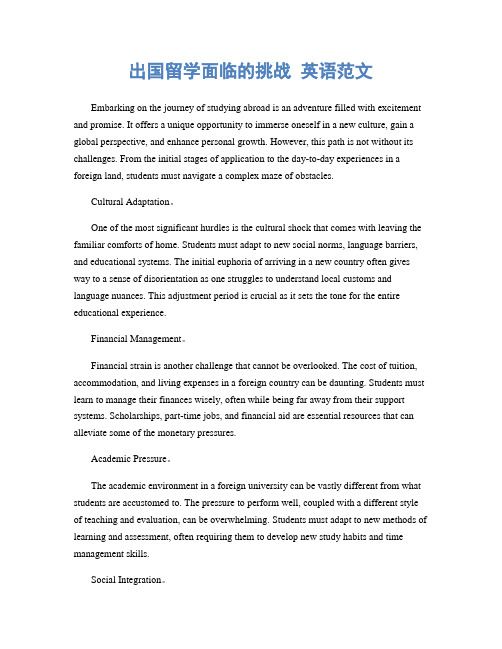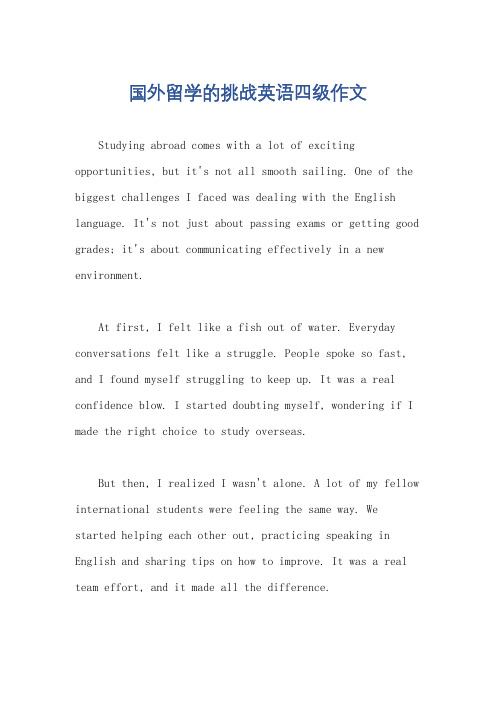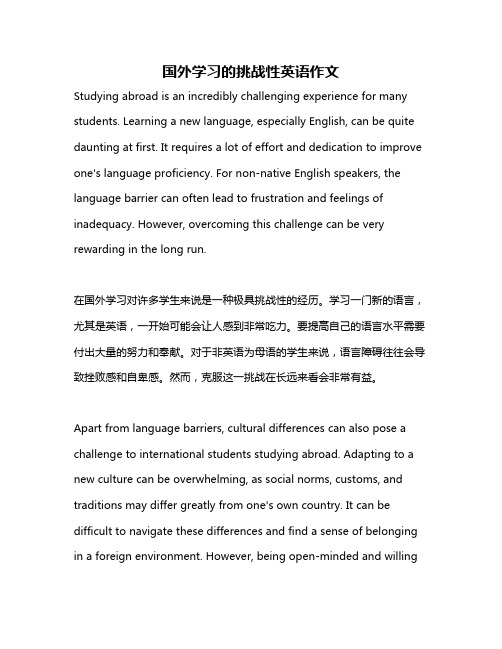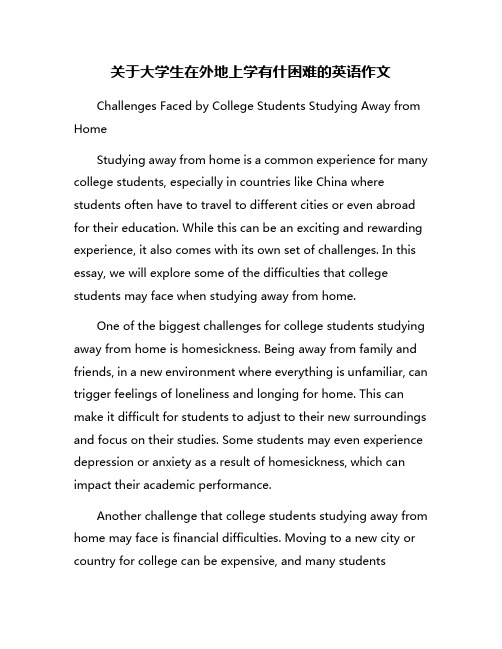[英语四级作文]2020年12月大学英语四级作文范文:关于在国外上学的挑战
出国留学面临的困难与挑战英语作文

出国留学面临的困难与挑战英语作文Studying abroad is a dream for many students, but it also comes with a lot of challenges and difficulties. The experience of studying in a foreign country can be both exciting and daunting. Here are some of the common difficulties and challenges that students might face when studying abroad.Firstly, language barrier is one of the biggest challenges for international students. If the language of instruction is not their first language, they may struggle to understand lectures, communicate with professors and classmates, and complete assignments. This can not only affect their academic performance but also their overall experience in the new country.Secondly, cultural differences can also pose a challenge for international students. The customs, traditions, and social norms in a foreign country may be very different from what they are used to. It can be difficult to adapt to a new culture, especially when it comes to making friends, building relationships, and engaging in social activities.Homesickness is another common difficulty for students studying abroad. Being away from family and friends, and adjusting to a new environment can be emotionally challenging. It can lead to feelings of loneliness, isolation, and depression, which can affect their mental well-being and academic performance.Additionally, financial constraints can also be a major hurdle for students studying abroad. The cost of tuition, accommodation, living expenses, and travel can add up to a significant amount. Many students have to rely on scholarships, part-time jobs, or financial aid to support their studies, which can be stressful and overwhelming.Moreover, the academic pressure of studying abroad can be intense. The education system, teaching methods, and expectations in a foreign country may be different from what students are accustomed to. They may have to adapt to new learning styles, study habits, and academic requirements, which can be challenging and demanding.In conclusion, studying abroad is a life-changing experience, but it also comes with a lot of difficulties and challenges. From language barrier to culturaldifferences, homesickness, financial constraints, and academic pressure, international students have to overcome various obstacles to succeed in their studies. However,with determination, resilience, and support from theirpeers and mentors, they can navigate through these challenges and make the most of their international education.出国留学面临的困难与挑战出国留学是许多学生的梦想,但也伴随着许多挑战和困难。
中国学生在海外学习回国英语作文

中国学生在海外学习回国英语作文English:Studying abroad is a popular choice for many Chinese students seeking a more diverse and comprehensive education experience. When these students return to China, they may face challenges in adapting to the differences in the education systems, teaching styles, and cultural norms between their host country and their home country. One common challenge is the need to switch back to using Mandarin instead of English as the primary language of instruction and communication. This can be especially difficult for students who have become accustomed to studying in English-speaking environments where they have developed strong language proficiency. Additionally, students may struggle with integrating their international education experience into the Chinese job market, as employers may not fully understand or value the skills and knowledge gained from studying abroad. Thus, returning Chinese students may need to actively seek opportunities to leverage their international experience, such as participating in networking events, pursuing further education, or seeking out globally-orientedcompanies. Despite these challenges, studying abroad can still provide valuable insights, skills, and perspectives that can benefit Chinese students in their future endeavors.中文翻译:留学是许多中国学生寻求更多元化和全面教育经验的热门选择。
出国留学遇到的挑战英语作文

出国留学遇到的挑战英语作文English Answer:Studying abroad presents a plethora of challenges, both academic and personal. These challenges can range from language barriers and cultural differences to financial constraints and homesickness. Despite these obstacles, the rewards of studying abroad often outweigh the difficulties.Academic Challenges.One of the most significant academic challenges faced by international students is the language barrier. Students who do not speak the native language of their host country may find it difficult to follow lectures, participate in class discussions, and complete assignments. Additionally, they may face academic systems and expectations that differ from those in their home countries.Cultural Differences.Cultural differences can also pose challenges for international students. Students may encounter different social norms, values, and customs in their host country. These differences can affect everything from the way they interact with others to the way they dress and eat.Students may also experience culture shock, which is a feeling of disorientation and confusion that can occur when one is exposed to a new culture.Financial Constraints.Studying abroad can be expensive. Internationalstudents may face tuition fees, living expenses, and other costs that can be higher than those in their home countries. Additionally, students may need to convert their currency, which can result in additional fees. To cover these costs, students may need to work part-time or take out loans.Homesickness.Homesickness is a common challenge for internationalstudents. Students may miss their families, friends, and familiar surroundings. They may also experience feelings of loneliness and isolation. To cope with homesickness, students can stay connected with their loved ones through phone calls, video chats, and social media. They can also join clubs and organizations that connect them with other international students.Personal Growth.Despite the challenges, studying abroad can also lead to significant personal growth. Students who study abroad develop independence, self-reliance, and adaptability. They also learn to appreciate different cultures and perspectives. These qualities are invaluable in today's globalized world.Conclusion.Studying abroad is a challenging but rewarding experience. International students who are willing to embrace the challenges and overcome the obstacles will findthat studying abroad can be a transformative experience that will benefit them both academically and personally.中文回答:留学面临的挑战。
出国留学面临的挑战 英语范文

出国留学面临的挑战英语范文Embarking on the journey of studying abroad is an adventure filled with excitement and promise. It offers a unique opportunity to immerse oneself in a new culture, gain a global perspective, and enhance personal growth. However, this path is not without its challenges. From the initial stages of application to the day-to-day experiences in a foreign land, students must navigate a complex maze of obstacles.Cultural Adaptation。
One of the most significant hurdles is the cultural shock that comes with leaving the familiar comforts of home. Students must adapt to new social norms, language barriers, and educational systems. The initial euphoria of arriving in a new country often gives way to a sense of disorientation as one struggles to understand local customs and language nuances. This adjustment period is crucial as it sets the tone for the entire educational experience.Financial Management。
国外留学的挑战英语四级作文

国外留学的挑战英语四级作文Studying abroad comes with a lot of exciting opportunities, but it's not all smooth sailing. One of the biggest challenges I faced was dealing with the English language. It's not just about passing exams or getting good grades; it's about communicating effectively in a new environment.At first, I felt like a fish out of water. Everyday conversations felt like a struggle. People spoke so fast, and I found myself struggling to keep up. It was a real confidence blow. I started doubting myself, wondering if I made the right choice to study overseas.But then, I realized I wasn't alone. A lot of my fellow international students were feeling the same way. We started helping each other out, practicing speaking in English and sharing tips on how to improve. It was a real team effort, and it made all the difference.The classes themselves were a challenge too. Professors often expected a higher level of English proficiency. Assignments, presentations, and exams all required a solid grasp of the language. I had to work hard to catch up, reading extra books, watching videos, and practicing my writing skills.Outside the classroom, there were other barriers. Simple things like shopping, ordering food, or navigating public transportation suddenly became more complicated. But with time, I learned to adapt. I started paying more attention to people's conversations, listening to their accents and trying to understand their slang.Looking back, I realize that overcoming the English language challenge was a crucial part of my growth as a student and as a person. It taught me resilience, patience, and the importance of never giving up. And.。
关于出国留学的挑战的作文英语

关于出国留学的挑战的作文英语Studying Abroad: Navigating the Challenges and OpportunitiesEmbarking on the journey of studying abroad can be both exhilarating and daunting. As a student, the decision to leave the comfort of one's home country and immerse oneself in a foreign culture is a significant step towards personal growth and academic advancement. However, this experience is not without its challenges, and navigating these obstacles is crucial to ensuring a successful and enriching study abroad experience.One of the primary challenges faced by students studying abroad is the language barrier. Adapting to a new language and communication style can be overwhelming, particularly in the early stages of the experience. Adjusting to the nuances of the local language, understanding colloquial expressions, and effectively conveying one's thoughts and ideas can be a daunting task. This language barrier can hinder academic performance, social interactions, and the ability to fully immerse oneself in the host country's culture.To overcome this challenge, students must be proactive in theirlanguage learning efforts. Enrolling in intensive language courses, engaging in conversation practice with native speakers, and immersing oneself in the local media can all contribute to a faster and more effective language acquisition process. Additionally, being patient and embracing the learning curve can help students develop the necessary language skills to thrive in their academic and social endeavors.Another significant challenge faced by students studying abroad is the adjustment to a new cultural environment. Each country and region has its own unique customs, social norms, and value systems, which can be vastly different from the student's home culture. Adapting to these cultural differences can be a complex and often overwhelming process, as it requires a deep understanding and respect for the host country's traditions and way of life.To navigate this challenge, students must be open-minded, curious, and willing to step out of their comfort zones. Engaging in cultural immersion activities, such as attending local festivals, trying traditional cuisine, or participating in community events, can help students gain a deeper appreciation for the host country's culture. Additionally, seeking out support from the international student community or local mentors can provide valuable insights and guidance on navigating the cultural differences.Financial considerations are another crucial aspect of studying abroad that can pose significant challenges for students. The costs associated with tuition, accommodation, transportation, and living expenses can be significantly higher in a foreign country, and students must carefully plan and budget their finances to ensure a successful and sustainable study abroad experience.To address this challenge, students should thoroughly research and explore various funding options, such as scholarships, grants, or financial aid programs offered by their home institution or the host university. Additionally, students can explore part-time job opportunities or internships in the host country to supplement their income and gain valuable work experience.Homesickness and social isolation can also be significant challenges for students studying abroad. Being away from family, friends, and familiar surroundings can lead to feelings of loneliness, depression, and a sense of disconnection. This can have a detrimental impact on a student's academic performance, mental health, and overall well-being.To mitigate these challenges, students should actively engage in social activities, join student organizations, and build a support network within the international student community. Maintaining regular communication with loved ones back home, through videocalls or other means, can also help alleviate feelings of homesickness. Additionally, seeking out counseling or mental health resources provided by the host university can be a valuable resource for students struggling with the emotional aspects of studying abroad.Despite the numerous challenges, studying abroad also presents a wealth of opportunities for personal and academic growth. Immersion in a new culture can broaden one's perspectives, enhance critical thinking skills, and foster a deeper understanding of global issues. The experience of navigating unfamiliar environments and overcoming obstacles can build resilience, adaptability, and problem-solving skills – all of which are highly valued in the job market and in various professional and personal endeavors.Moreover, studying abroad can open up a world of new academic and research opportunities. Students may have access to specialized programs, cutting-edge facilities, or renowned faculty that are not available in their home institutions. This exposure to diverse educational experiences can greatly enhance a student's academic and intellectual development, ultimately leading to more robust and well-rounded educational outcomes.In addition to the academic benefits, studying abroad can also provide opportunities for personal growth and self-discovery. The experience of living independently in a foreign country, making newfriends, and exploring unfamiliar surroundings can lead to a deeper understanding of one's own strengths, weaknesses, and values. This self-awareness can translate into increased confidence, independence, and a greater sense of purpose, all of which can be invaluable assets in both academic and professional pursuits.Furthermore, studying abroad can foster valuable cross-cultural connections and networking opportunities. By engaging with a diverse community of students, faculty, and locals, individuals can build a global network of contacts and collaborators, which can be instrumental in future academic, professional, and personal endeavors.In conclusion, studying abroad is a transformative experience that presents both challenges and opportunities. While navigating the obstacles of language barriers, cultural differences, financial considerations, and homesickness can be daunting, the personal and academic growth that can be achieved through this experience is truly remarkable. By embracing the challenges, leveraging the opportunities, and maintaining a positive and resilient mindset, students can emerge from their study abroad journey as more well-rounded, adaptable, and globally-minded individuals, poised to make a meaningful impact in an increasingly interconnected world.。
国外学习的挑战性英语作文

国外学习的挑战性英语作文Studying abroad is an incredibly challenging experience for many students. Learning a new language, especially English, can be quite daunting at first. It requires a lot of effort and dedication to improve one's language proficiency. For non-native English speakers, the language barrier can often lead to frustration and feelings of inadequacy. However, overcoming this challenge can be very rewarding in the long run.在国外学习对许多学生来说是一种极具挑战性的经历。
学习一门新的语言,尤其是英语,一开始可能会让人感到非常吃力。
要提高自己的语言水平需要付出大量的努力和奉献。
对于非英语为母语的学生来说,语言障碍往往会导致挫败感和自卑感。
然而,克服这一挑战在长远来看会非常有益。
Apart from language barriers, cultural differences can also pose a challenge to international students studying abroad. Adapting to a new culture can be overwhelming, as social norms, customs, and traditions may differ greatly from one's own country. It can be difficult to navigate these differences and find a sense of belonging in a foreign environment. However, being open-minded and willingto learn about different cultures can lead to personal growth and a broader understanding of the world.除了语言障碍,文化差异也可能给在国外留学的国际学生带来挑战。
关于大学生在外地上学有什困难的英语作文

关于大学生在外地上学有什困难的英语作文Challenges Faced by College Students Studying Away from HomeStudying away from home is a common experience for many college students, especially in countries like China where students often have to travel to different cities or even abroad for their education. While this can be an exciting and rewarding experience, it also comes with its own set of challenges. In this essay, we will explore some of the difficulties that college students may face when studying away from home.One of the biggest challenges for college students studying away from home is homesickness. Being away from family and friends, in a new environment where everything is unfamiliar, can trigger feelings of loneliness and longing for home. This can make it difficult for students to adjust to their new surroundings and focus on their studies. Some students may even experience depression or anxiety as a result of homesickness, which can impact their academic performance.Another challenge that college students studying away from home may face is financial difficulties. Moving to a new city or country for college can be expensive, and many studentsstruggle to cover the cost of tuition, accommodation, food, and other living expenses. Some students may have to take onpart-time jobs or rely on scholarships and financial aid to make ends meet, which can be stressful and time-consuming.In addition to homesickness and financial difficulties, college students studying away from home may also face academic challenges. Adjusting to a new education system, language, or teaching style can be daunting, and some students may struggle to keep up with coursework or exams. This can lead to feelings of inadequacy and self-doubt, which can impact students' confidence and motivation.Furthermore, college students studying away from home may also face social challenges. Building new friendships and support networks in a new city or country can be challenging, especially for shy or introverted students. It can be hard to find people who share similar interests or values, and some students may feel isolated or excluded from social activities. This can impact students' mental health and overall well-being.To overcome these challenges, college students studying away from home can take several steps. Building a strong support network of friends, classmates, or mentors can help students feel less lonely and more connected to their newenvironment. Seeking help from counselors or mental health professionals can also provide students with the support they need to cope with homesickness or academic stress. Additionally, staying organized and managing time effectively can help students balance their academic and personal responsibilities, reducing feelings of overwhelm and anxiety.In conclusion, studying away from home can be a rewarding but challenging experience for college students. From homesickness and financial difficulties to academic and social challenges, there are many obstacles that students may face when studying in a new city or country. By seeking support, staying organized, and maintaining a positive attitude, students can overcome these challenges and make the most of their college experience away from home.。
- 1、下载文档前请自行甄别文档内容的完整性,平台不提供额外的编辑、内容补充、找答案等附加服务。
- 2、"仅部分预览"的文档,不可在线预览部分如存在完整性等问题,可反馈申请退款(可完整预览的文档不适用该条件!)。
- 3、如文档侵犯您的权益,请联系客服反馈,我们会尽快为您处理(人工客服工作时间:9:00-18:30)。
前天,也就是上星期六,大学英语四六级考试结束,很多同学在微博或者朋友圈分享了他们的感受:这个单词是什么意思?四级考试需要带耳机才能听吗?作文翻译是什么鬼!真的是要笑是我了,厉害!言归正传,今天给大家分享一篇四级作文,仅供参考哟!
The Challenges of Studying abroad
Recently, studying in foreign colleges and universities has gained in popularity in our society, especially among somerich families in big cities. According to a survey in 1500 parents, approximately one third of them admit that they plan to send their kids to studyin a foreign country.
Undoubtedly, studying abroad is very beneficial to Chinese high-school students. For example, an overseas experience will broaden their horizons andenrich their life experience. Besides, it exposes these students to different cultures and people with different backgrounds. However, its challenges can never beignored. For some students, they have to take a part-time job to supportthemselves when studying abroad and this will exert a tremendously negative effect on their study efficiency. Since they cannot concentrate on their school activities, they will not have a successful and fulfilling college career. In addition, students who live in foreign countries may face security problems aswell as cultural shock.
To solve these problems, the mainstream media and educational institutions should launch more campaigns or provide more lectures so that Chinese students can have a more comprehensive knowledge of the life and cultures in different countries. I sincerely hope that every individual can reap a huge benefit inthis process.
翻译原文对照:
最近几年,我们社会上流行起去国外上大学,尤其是在一些大城市的富裕家庭里。
根据一项在1500名家长中做的调查,超过三分之二的家长承认他们考虑将他们的孩子送到国外大学。
不可否认,去国外上大学对于中国高中生们来说非常有好处。
例如,一段海外经历可以扩宽你的视野,丰富你的人生阅历,并让你接触到不同背景的人和文化。
然而,它的挑战也是不容忽视的。
对于一部分学生来说,他们需要靠兼职来养活自己,这对他们的学习效率产生了极大的负面影响。
因为他们无法集中精力学习,所以他们无法拥有一个成功的大学生涯。
同时,在国外上大学的中国学生还可能会有安全问题或文化差异。
为了解决这些问题,主流媒体和教育机构应该发起更多的活动或者提供更多的讲座,来帮助中国学生更加全面地了解外国的生活和文化。
衷心希望大家能在此过程中受益。
没有信心通过的同学们,好好准备明年的四六级考试吧,加油!。
